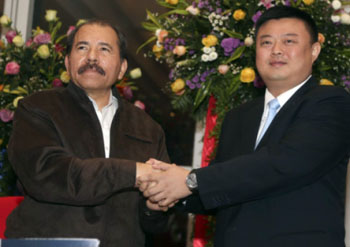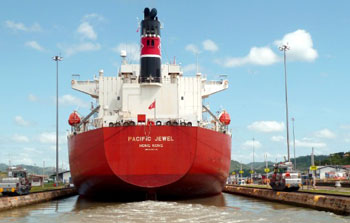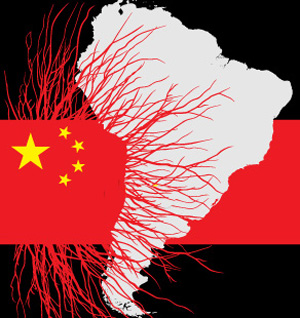Did China Buy Nicaragua?
A potentially disastrous foreign policy situation for the U.S. has arisen: Communist China now appears to have all but purchased the Central American nation of Nicaragua.
Central America was once considered part of America's "backyard."
 Daniel Ortega celebrates the canal deal with Wang
Wang Jing, the president of Hong Kong-based HKND Group, recently signed an agreement with Nicaraguan president (and former Communist guerrilla) Daniel Ortega to build a canal connecting the Atlantic and Pacific Oceans. The 100 year canal agreement was quickly passed by the Nicaraguan legislature, which is controlled by Ortega's Marxist Sandinista Party.
Daniel Ortega celebrates the canal deal with Wang
Wang Jing, the president of Hong Kong-based HKND Group, recently signed an agreement with Nicaraguan president (and former Communist guerrilla) Daniel Ortega to build a canal connecting the Atlantic and Pacific Oceans. The 100 year canal agreement was quickly passed by the Nicaraguan legislature, which is controlled by Ortega's Marxist Sandinista Party.
Wang also heads the Beijing-based Xinwei Telecom Enterprise Group. In January of 2013 the Xinwei group acquired the right to operate Nicaragua's cellphone and internet services.
One of the stated priorities of the canal is to relieve the high level of poverty in Nicaragua, but the terms of the agreement are so favorable to China that Nicaragua appears to have bargained away its sovereignty, and in the process insured that Ortega will stay in power for many years.
If a similar deal was struck with the United States, it would have been branded "Yankee imperialism," Nicaragua would have been labeled a banana republic and Ortega a "puppet of the Americans."
An opposition member of the Nicaraguan legislature, Victor Hugo Tinoco, has stated that the canal project gives to the newly established HKND group the absolute right to decide when, where, and how to construct the canal, according to a recent article in Spanish in the Miami newspaper Diario las Americas.
HKND's control is so complete that all subprojects of the canal's construction can be given to any entity without the permission of the Nicaraguan government. According to the way the law is written, "Al Qaeda could end up buying into the canal,” according to legislative member Eliseo Nunez Morales, also quoted by Diario las Americas.
A former member of Ortega's ruling Sandinista Party, and now an opponent of Ortega and his regime, Edmundo Jarquin, challenged the entire idea of the proposed 40 billion dollar canal project in the same article, and questioned if the canal project was meant to give the impression that Ortega was indispensable to the completion of the project and as a result must necessarily remain in office.
 Hong Kong ship in Panama, already operated by a Chinese corporation
The canal project "creates the illusion that people will come out of poverty overnight, and ultimately sells the idea that Ortega is essential, unavoidable and, therefore, must remain indefinitely in power," Jarquin stated.
Hong Kong ship in Panama, already operated by a Chinese corporation
The canal project "creates the illusion that people will come out of poverty overnight, and ultimately sells the idea that Ortega is essential, unavoidable and, therefore, must remain indefinitely in power," Jarquin stated.
"It's not even remotely plausible,” Jarquin asserted. He argued that the time given for feasibility studies for the $40 billion canal project is less than what is normally allotted for "a simple road."
Further, no exact route for the canal has yet been determined.
The project promises to be an ecological disaster, putting in danger Nicaragua's largest body of fresh water, as angry street protestors have pointed out. At this time, there is no obvious financing for the costly project, and Wang's corporate expertise is in telecommunications, not construction. The multi-billion dollar project is being initiated in a slow economy with the commercial need for a new canal highly uncertain.
The proposed Nicaraguan canal is the latest of Beijing's projects in Latin America. A Communist Chinese corporation already operates the Panama Canal, and Beijing has constructed the world's largest shipping container facility in the Bahamas, 80 miles from U.S. shores.
 China's roots are extending throughout South America
China has ready cash for Latin American governments, and is involved in a range of projects down to the operation of hotels, resorts and casinos. China is also propping up the Castro brothers’ regime in Cuba and is giving aid to the tottering Marxist and Chavez-less government in Venezuela. In early June 2013, China's new president, Xi Jinping, signed a number of cooperation agreements with Mexico and Costa Rica during his visit to the region.
China's roots are extending throughout South America
China has ready cash for Latin American governments, and is involved in a range of projects down to the operation of hotels, resorts and casinos. China is also propping up the Castro brothers’ regime in Cuba and is giving aid to the tottering Marxist and Chavez-less government in Venezuela. In early June 2013, China's new president, Xi Jinping, signed a number of cooperation agreements with Mexico and Costa Rica during his visit to the region.
China's financial offensive in South America is in contrast to its aggressive policy toward its neighbors in Southeast Asia. There, Beijing's claims to most of the South China Sea has put China in conflict with Japan, Philippines and Taiwan. China's boldness in its assertion of control of vast areas of the South China Sea, which is a vital shipping lane and possibly rich in oil, is made possible by Beijing's military buildup.
The question for the United States is this: Will Beijing be satisfied with its considerable commercial and financial influence in South America? Or will China eventually seek to extend its military muscle into Central America as well, which once was "America's backyard"?
Central America was once considered part of America's "backyard."
 Daniel Ortega celebrates the canal deal with Wang
Daniel Ortega celebrates the canal deal with WangWang also heads the Beijing-based Xinwei Telecom Enterprise Group. In January of 2013 the Xinwei group acquired the right to operate Nicaragua's cellphone and internet services.
One of the stated priorities of the canal is to relieve the high level of poverty in Nicaragua, but the terms of the agreement are so favorable to China that Nicaragua appears to have bargained away its sovereignty, and in the process insured that Ortega will stay in power for many years.
If a similar deal was struck with the United States, it would have been branded "Yankee imperialism," Nicaragua would have been labeled a banana republic and Ortega a "puppet of the Americans."
An opposition member of the Nicaraguan legislature, Victor Hugo Tinoco, has stated that the canal project gives to the newly established HKND group the absolute right to decide when, where, and how to construct the canal, according to a recent article in Spanish in the Miami newspaper Diario las Americas.
HKND's control is so complete that all subprojects of the canal's construction can be given to any entity without the permission of the Nicaraguan government. According to the way the law is written, "Al Qaeda could end up buying into the canal,” according to legislative member Eliseo Nunez Morales, also quoted by Diario las Americas.
A former member of Ortega's ruling Sandinista Party, and now an opponent of Ortega and his regime, Edmundo Jarquin, challenged the entire idea of the proposed 40 billion dollar canal project in the same article, and questioned if the canal project was meant to give the impression that Ortega was indispensable to the completion of the project and as a result must necessarily remain in office.
 Hong Kong ship in Panama, already operated by a Chinese corporation
Hong Kong ship in Panama, already operated by a Chinese corporation"It's not even remotely plausible,” Jarquin asserted. He argued that the time given for feasibility studies for the $40 billion canal project is less than what is normally allotted for "a simple road."
Further, no exact route for the canal has yet been determined.
The project promises to be an ecological disaster, putting in danger Nicaragua's largest body of fresh water, as angry street protestors have pointed out. At this time, there is no obvious financing for the costly project, and Wang's corporate expertise is in telecommunications, not construction. The multi-billion dollar project is being initiated in a slow economy with the commercial need for a new canal highly uncertain.
The proposed Nicaraguan canal is the latest of Beijing's projects in Latin America. A Communist Chinese corporation already operates the Panama Canal, and Beijing has constructed the world's largest shipping container facility in the Bahamas, 80 miles from U.S. shores.
 China's roots are extending throughout South America
China's roots are extending throughout South AmericaChina's financial offensive in South America is in contrast to its aggressive policy toward its neighbors in Southeast Asia. There, Beijing's claims to most of the South China Sea has put China in conflict with Japan, Philippines and Taiwan. China's boldness in its assertion of control of vast areas of the South China Sea, which is a vital shipping lane and possibly rich in oil, is made possible by Beijing's military buildup.
The question for the United States is this: Will Beijing be satisfied with its considerable commercial and financial influence in South America? Or will China eventually seek to extend its military muscle into Central America as well, which once was "America's backyard"?
No comments:
Post a Comment
Comments always welcome!